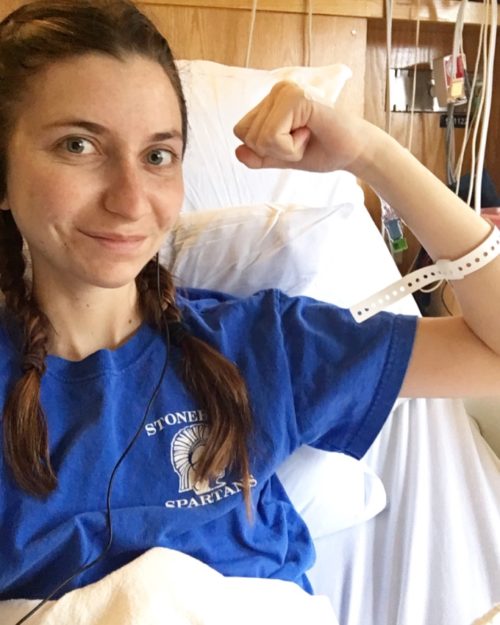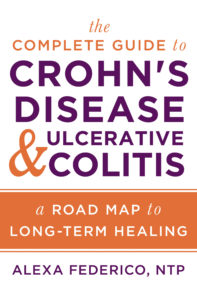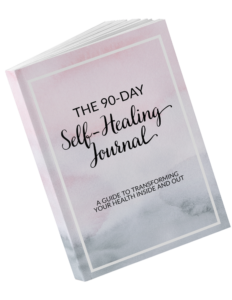This post contains affiliate links to products that I think will be helpful. You are under no obligation to buy through me, however, if you do I receive a small percentage of the sale, which goes to running a website.
Recently, I had my first admittance into the hospital for treating my Crohn’s disease in 10 years. My doctors were shocked I have been able to care for myself so well without any major problems or need for surgery. Luckily, I didn’t need more than antibiotics and Prednisone to help me feel better and come home, after one week.
While this experience is still fresh in my mind I want to share my best tips for having the most comfortable and smooth hospital stay as possible.
1. Bring (Plenty of) Your Own Clothes and Toiletries
Nothing makes me feel more like a sick person than wearing the hospital gowns, pants, and socks. When you put me in those clothes, stick me in a bed, and hook me up to an IV, the “sick person” mentality easily takes over and I swear I start feeling weaker and sicker than I actually am.
I am blessed that my mom stayed with me every day. My dad came around his work schedule and I had lots of other family and friends visit as well. There were many opportunities to have people bring things at home to keep my comfortable.
Make sure to have extras of everything! You want to put on fresh clothes every day. It helps you to feel like a real person.
Clothes, toiletries, and miscellaneous items to pack:
- Loose t-shirts to wear to bed and during the day (I changed them daily!) Make sure they are short-sleeved so your arm is accessible for IVs and blood draws.
- Pajama pants to wear to bed. Again, sleeping in my own clothes restores a sense of normalcy. I had warmer ones and thinner ones to accommodate the warmth in the room.
- Lots of underwear and socks.
- A pair of moccasins/slippers to walk around in
- A blanket if you want something extra warm or that reminds you of home
- A loose sweater or sweatshirt I could wear when I was cold, since I was wearing a short-sleeve t-shirt every day. This was also helpful when I went on my daily walks throughout the hospital where some parts were very chilly.
- My own toothbrush, toothpaste, bar of soap, face wash, dry shampoo and deodorant. The hospital can supply you with these, but I prefer my non-toxic versions. Again, I like the way these work and feel on my body, too. Pack shampoo and conditioner if you plan on showering there, if you don’t want to use the hospital’s.
- A heating pad
2. Bring Food And/Or Supplements From Home
Hospital food can be downright gross to not-so-bad. Luckily, I found the food at Massachusetts General Hospital to be on the better side! I told my team that I ate gluten free, so the menus I ordered from each day showed me gluten free options. Now, there were still things I wouldn’t order like ice cream or soy milk, so I just avoided them.
I often went for sandwiches on gluten free bread, white rice, bunless burgers, broth, and veggies. For breakfast I had scrambled eggs and gluten free toast. I had some bone broth from home and two Pyrex containers filled with white rice, ground bison, and an avocado to add. I heated this in the microwave on the floor. Other than that I didn’t feel like I needed to stock the floor’s fridge with my own food. I was being accommodated quite well. If your hospital isn’t as accommodating you have every right to bring your own food!
Things you might want to supplement your hospital diet with from home are:
- Bone broth
- Soup
- Gluten or grain free bread
- Nut butters
- Healthy snack or protein bars, meat bars/sticks/jerky
- Fresh fruit
- Your favorite tea bags
- Gluten free crackers
- Filtered water from home

Breakfast one day: Scrambled eggs, GF toast with butter and chicken sausage. They only had the chicken sausage one day, so breakfast was usually two piece of toast and eggs.

Dinner one night: roast turkey, butternut squash, and broccoli.
When it comes to supplements, you can bring in yours from home assuming your doctors approve. The supplements need to be put into the pharmacy’s system but other than that you should be fine!
I didn’t bring mine in, but that doesn’t mean you can’t. I just chose to do what they suggested and I knew I would get back on my own track in a matter of days.
3. Bring Things to Pass the Time
A lot of time during a hospital stay is waiting time. Basically, you are there to go through any tests (CT scans, MRIs, ultra sounds, colonoscopy/endoscopy, etc.), have your blood drawn, be visited briefly by your team of doctors 1-2 times a day, and more often by your nurse. Other than that, you eat your three meals delivered to your room and not much else is expected of you.
These are the activities I had on hand, plus some more that would be great that I didn’t bring this time:
- Cell phone + charger for all your social media scrolling!
- Podcasts on said cell phone. I utilize podcasts as a learning opportunity. I like to listen to either health, business, or self improvement podcasts.
- Your laptop, charger, and dvds to watch (I brought a couple seasons of The Office, my favorite). If you have Netflix or Hulu, then you’re all set!
- Adult coloring book and colored pencils
- Old fashioned books! I was reading Eat The Yolks and The Universe Has Your Back.
- Something to crochet, knit, or sew, if you do that.
- Use the time to plan or do things you have been putting off. Make those phone calls, schedule those appointments, sort out your finances in a spreadsheet, research recipes you want to make when you get home, or anything else you can do with a phone, laptop, or pen and paper.
Additional items to bring (but the hospital may have stocked):
- Ear buds
- Eye mask to help you sleep when lights are turned on at all hours of the night
- Ear plugs for noisy nights and disruptive roommates
4. Get Out of Your Room
Along with hospital clothes making me feel like the sick person that I am not, sitting in a bed all day does that too! Aside from it being unhealthy to lay in a bed all day (with an increased chance of blood clotting especially during a Crohn’s or colitis flare), laying in bed is both depressing and boring.
Every morning after I had my daily blood draw, morning meds, and breakfast I would go to the bathroom to wash up and put on fresh clothes. I sat up in bed with the head of the bed all the way raised. Then I would read or listen to a podcast until my doctors came by for the morning with a quick check in. After I talked to them, my mom and I would stroll around the hospital. It’s a large hospital and there are endless new parts to walk through.
Often, we would find an area with some seats in front of big windows and would watch the street traffic and people walking by for a little bit. Then, we would continue walking until we found a new area just to move our bodies and change the scenery.
Since I have a big appetite (and was on Prednisone), I was hungry before my lunch tray would arrive around 12, so we usually stopped in the cafeteria between breakfast and lunch so I could eat again. The cafeteria is a great people-watching spot!
If it’s nice out, ask your nurse if it’s okay for you to go outside and then do so! At Mass General, there is a patio called The Healing Garden, and it is beautiful. It was a bit chilly during my stay so I didn’t go out there, but we viewed it from indoors. Breathing fresh air is healthy for us but also relaxes us, decreases stress, and that in turn dials down inflammation.
5. Advocate for Yourself, Even if it Feels Like You’re Being Pushy
My personality by nature is to stay quiet, not ruffle any feathers, and let things fall as they may.
Let me be clear, when you have a chronic illness or are in the hospital for any reason, THIS IS NOT THE WAY TO BE.
I was lucky to have my super duper mom with me all the time. She is not only a nurse and understands the way a hospital functions, but she has always been my #1 advocate.
Here are some examples of ways to advocate for yourself so you get the best/quickest treatment:
- Don’t downplay your pain or needs. When we were waiting to be taken into the ER I told the first nurse I talked to that my pain was a 6. Now, at this point it was the worst it had been. It was probably an 8. Why did I say a 6? Well, I have always downplayed my pain because I can tolerate it well, so I don’t like to make a “fuss” about it. Don’t do as I do here! My mom told me after I should have said the pain was higher (because it was) and they take the patients with more severe pain first.
- Ask questions about medications. Every med or treatment option is optional! When I was told I as given antibiotics I asked why, because I really didn’t want to expose my gut to them. I also inquired about other steroid options that I thought might be less harsh over Prednisone. I ended up going with both, but not after having a productive conversation and educating myself. They suggested I get a daily shot in my belly, which was a blood thinner. This is something being offered to all patients, but they said chances of blood clots during IBD flares were higher so it was recommended by my doctors. However, I was not about getting more shots if I could avoid it. I walked several times a day, moved my legs around in bed, and stayed hydrated so I politely declined. I am happy to report I avoided any blood clots.
- Towards the end of my stay one morning I had to start the clear liquids diet for my colonoscopy/endoscopy prep. I started with only clear liquids right after breakfast that day. I was hoping I would go right in the following morning but they were packed, and I ended up getting one of the last slots in the day. Yep, I was one hungry, cranky lady. As the time ticked and there was still no mention of me going down, I was filled with dread that I would be bumped to the next day. I was anxious and frustrated. My mom went to talk to my nurse and she made more calls, which resulted in someone bring me down to the procedure room. Thanks, Mom!

I had about 8 flower arrangements delivered. They lined my window sill and were all so different and beautiful!
6. Be Appreciative and Kind to All Staff You Encounter
I had fabulous care at Mass General. Seriously, I loved every single doctor and nurse that worked with me. I felt like they genuinely cared about me and had my best interests in mind.
That being said, sometimes we aren’t feeling well in the hospital. We might be in physical pain, or feeling depressed about being in the hospital, or we may be hangry from fasting for tests. It is so important to show your gratitude for all that these people are doing for you. This is hard work and your health is important. These professionals are doing their best to get you better ASAP.
The woman who delivered my meal trays every day knew me by name and greeted me so whenever she saw me. One day when I was walking in the hall coming back from a walk she shouted from a different direction, “Alexa, I left your lunch tray in your room!” Like, how nice of her to let me know my lunch was waiting for me?
There was a day when my hot water was missing for breakfast and she got it right away. When I was being discharged, she heard about it and came in to give me a hug. I let her know she was great at her job and thanked her for being so kind to me every day. I truly looked forward for the multiple times she entered my room because she was bright and welcoming.
When you are kind to the people helping you, they might be able to help you out a bit extra in certain situations, something they might not bother doing for a patient who is rude.
*Bonus* If you have family and friends that can make time to visit, let them come!
Chatting with friends and family can be the best cure of all. Catch them up on your life and listen to what is going on in their worlds. Have some laughs; after all laughter is amazing medicine!
This is also an opportunity to have them bring you things you need.

My lovely friend, Jamie (Sweetened By Nature) came to visit and brought me these treats!
I hope these bits of advice help you if you need to be hospitalized (although I hope you don’t!)
Do you have more pieces of advices to share? I would love to hear your tips! Just leave them in the comments below. 🙂







